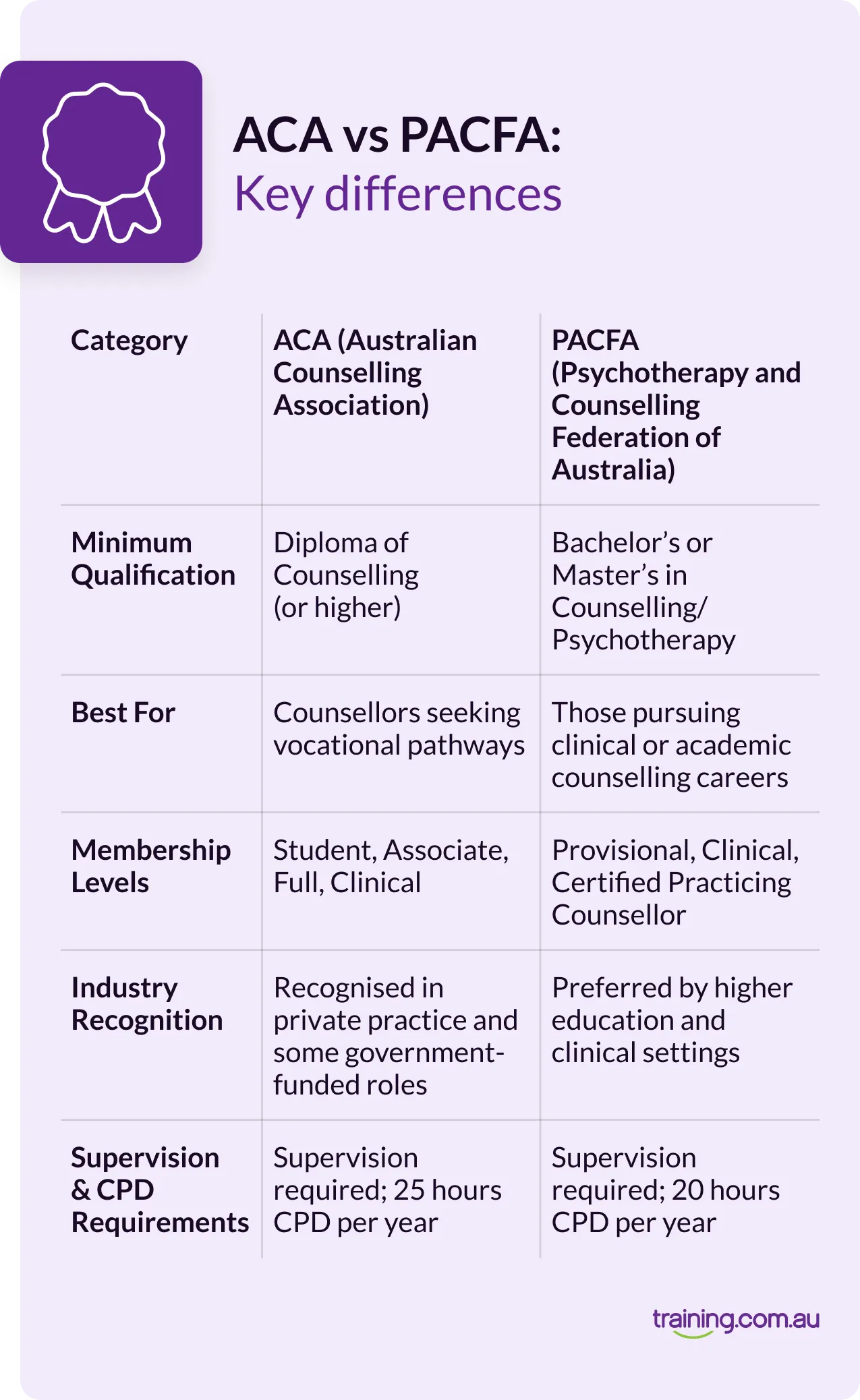How to Get Your Counselling Accreditation and Registration

Embarking on a counselling career in Australia offers a fulfilling opportunity to support people in navigating life’s challenges. While it’s not a legal requirement, gaining counselling accreditation in Australia can significantly enhance your standing within the counselling profession.
Reputable bodies like the Australian Counselling Association (ACA) and the Psychotherapy and Counselling Federation of Australia (PACFA) offer this accreditation. It can greatly improve your credibility, help you specialise in specific areas, and open up more full-time employment opportunities.
Understanding counselling accreditation in Australia
In Australia, counselling operates as a self-regulated profession. This means there is no legal requirement for counselling registration or licensing. However, completing an accredited counselling qualification and obtaining professional accreditation can provide a strong foundation for a long-term counselling career.
The ACA and PACFA uphold high standards for professional counselling and psychotherapy, ensuring adherence to ethical guidelines and encouraging further studies and ongoing professional development.
As part of these standards, psychotherapy training is crucial for Clinical and Provisional Registrants, requiring substantial person-to-person counselling and specific hours of psychotherapy training to ensure competency in mental health practice.
Becoming a qualified counsellor
Becoming a qualified counsellor requires a combination of education, training, and experience. In Australia, the Australian Counselling Association (ACA) and the Psychotherapy and Counselling Federation of Australia (PACFA) are the two main professional bodies that accredit counselling courses and register qualified counsellors.
For ACA membership, there are two levels:
- Level 1 requires a Diploma
- Level 2 requires a Bachelor’s or Master’s degree.
On the other hand, PACFA membership requires a Bachelor’s or Master’s degree.
These courses, offered at universities and colleges, cover essential topics like counselling theories, skills, and practices, as well as ethics and professional development. This foundational education ensures you are well-prepared to enter the counselling profession.
In addition to formal education, many counsellors engage in ongoing professional development (OPD) courses and workshops to enhance their skills and knowledge. OPD is crucial for maintaining registration with the ACA and PACFA, helping counsellors stay up-to-date with the latest research and best practices in the field.
Steps to become an accredited counsellor
Complete a professional qualification
Start by completing an ACA-accredited course such as a Diploma of Counselling or a Bachelor of Counselling. Ensure that the program you choose meets counselling accreditation requirements set by ACA or PACFA.
Gain practical experience
Accumulate supervised practical experience as required by the accrediting body. This typically involves a set number of counselling sessions and client contact hours under professional supervision.
Apply for membership
After completing your education and practical experience, apply for counselling registration with ACA or PACFA. Membership levels may vary based on your qualifications and experience.
Continuing Professional Development (CPD)
Maintain your accreditation by engaging in ongoing training, counselling skills workshops, and professional supervision, as required by your accrediting body. Staying in the loop of the latest industry news is also a great way to stay relevant and continue learning.

How to become a counsellor in Australia
Discover how to become a counsellor in Australia, including qualifications, pathways, skills needed, and tips to start a rewarding counselling career.
What is better, ACA or PACFA?
In Australia, the two primary professional organisations for registered counsellors are the Australian Counselling Association (ACA) and the Psychotherapy and Counselling Federation of Australia (PACFA). However, they serve different purposes and suit different career goals.
Graduation from an ACA-accredited course is necessary for registration and outlines ongoing professional development requirements specific to ACA accreditation.
Australian Counselling Association
As the largest counselling association in the country, ACA offers membership at various levels — from student to clinical. It is widely recognised across private practice, community services, and some government-funded programs. ACA is also often preferred by graduates of Diploma of Counselling programs seeking full-time or flexible employment.
ACA-accredited courses are recognised for their high standards and professional development opportunities.
Psychotherapy and Counselling Federation of Australia
This body tends to focus more on counsellors who have completed higher education qualifications, such as a Bachelor’s or Master’s degree. PACFA has strong recognition within mental health services, academic settings, and the psychotherapy field.
Psychotherapy training is crucial for PACFA recognition, ensuring that registrants have substantial person-to-person counselling experience. It is a good fit for those wanting to specialise in clinical roles or undertake further studies in counselling or psychology.
Ultimately, your choice between ACA and PACFA will depend on your career direction and qualification level. Many professionals opt for dual membership to broaden their career options and access the benefits of both networks.
Specialising in counselling
Counsellors have the opportunity to specialise in various areas, such as mental health, relationships, trauma, or addiction.
Specialising in a particular area requires additional education, training, and experience. For instance, a counsellor who wants to focus on mental health may need to complete a postgraduate degree in mental health or a related field.
Specialising in counselling can also involve obtaining certifications or diplomas in specific areas, such as cognitive-behavioural therapy (CBT) or eye movement desensitisation and reprocessing (EMDR). These certifications not only demonstrate a counsellor’s expertise but also their commitment to a particular area of practice.
By specialising, counsellors can provide more targeted and effective support to their clients, enhancing their counselling sessions and overall impact in the community services sector.

Not sure which counselling course is best for your career?
You might already have more of the essential skills than you realise. From empathy to active listening, this blog highlights five counselling skills you may already possess.
Benefits of professional accreditation
Credibility
Accreditation signals that you uphold professional standards and ethical practices — a key factor in building trust with clients and employers. Being ACA accredited is also crucial for registered counsellors, as it ensures they have completed an accredited course and meet ongoing professional development requirements
Professional development
Accredited members gain access to industry seminars, counselling resources, and counselling skills workshops. Ongoing professional development often includes advanced psychotherapy training.
Networking opportunities
Being part of a professional organisation connects you with a wider community of counsellors, offering collaboration and peer support throughout your counselling profession. Additionally, being ACA accredited connects you with a wider community of professional counsellors.
Insurance access
You become eligible for professional indemnity insurance, which is essential for protecting your counselling practice. ACA-accredited members are also eligible for professional indemnity insurance.
Enhanced employment prospects
Many employers prefer to hire registered counsellors who have completed accredited courses and hold professional memberships. Many employers also prefer to hire ACA-accredited counsellors.
Maintaining your accreditation and registration
To maintain accreditation and registration with the ACA and PACFA, counsellors must engage in ongoing professional development (OPD) courses and workshops. OPD is essential for staying current with the latest research and best practices in the field, demonstrating a commitment to ongoing learning and professional growth.
In addition to OPD, counsellors must adhere to the ACA and PACFA codes of ethics and professional conduct. These codes outline the standards and principles that govern the counselling profession, ensuring that counsellors provide high-quality services to their clients.
Maintaining accreditation and registration also involves regular supervision and peer review.
Supervision involves: Working with a more experienced counsellor to discuss cases, receive feedback, and develop skills.
Peer review involves: Collaborating with other counsellors to review and discuss each other’s work.
By maintaining accreditation and registration, counsellors demonstrate their dedication to the counselling profession and their clients. It also ensures that they provide high-quality services that meet the needs of their clients, reinforcing their role as trusted health professionals in the counselling and psychotherapy profession.

The ultimate guide to counselling in Australia
Whether you’re just starting out or considering a meaningful career change, counselling offers a rewarding path where you can truly make a difference.
Why counselling accreditation matters for your counselling career
Becoming an accredited counsellor in Australia can provide valuable advantages, from boosting employment opportunities to giving you a platform to specialise and pursue further studies in your chosen field. While accreditation is not legally required, it demonstrates your commitment to ethical standards and professional growth. Being ACA accredited can further enhance your employment prospects.
Whether your goal is to work in private practice, mental health, education, or community services, accreditation is an important step toward becoming a trusted professional in the field. Comprehensive psychotherapy training is essential for specialisation and professional growth.
Ready to take the next step in your counselling journey?

